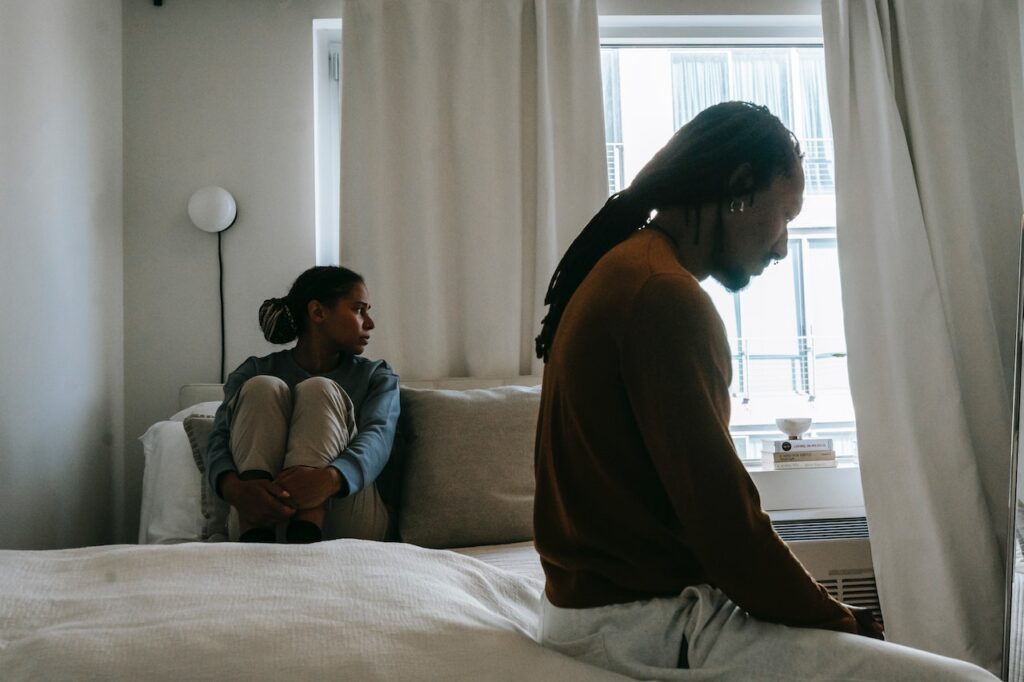
Coping with relationship anxiety can be a daunting challenge. It’s a term often used, yet not everyone understands its deep implications. Relationship anxiety refers to the fear, insecurity, and unease related to romantic relationships, from fear of rejection to feelings of inadequacy. This article delves into understanding relationship anxiety, its impact, and effective coping strategies, offering practical tips and insights for overcoming this hurdle.
Relationship anxiety can be a silent killer for many relationships. It has the potential to corrode the trust and intimacy in a relationship over time, creating an environment of fear and insecurity. This article explores the intricacies of relationship anxiety and offers practical strategies for managing it effectively.
Understanding Relationship Anxiety
We’ll start by delving into what relationship anxiety is, how it manifests, and what causes it. This understanding will provide a solid foundation for the coping mechanisms we will explore later.
Recognizing the Symptoms of Relationship Anxiety
Just as a physical illness has symptoms, relationship anxiety also has signs that can help in its recognition. People experiencing relationship anxiety may have constant worries about their partner leaving them, they might obsess over their partner’s activities or need constant reassurance of their partner’s feelings towards them. These symptoms, however, can vary in intensity and frequency among individuals.
Unearthing the Causes of Relationship Anxiety
Relationship anxiety does not have a singular cause. Instead, it’s usually a complex interplay of various factors, such as past relationship experiences, childhood trauma, or personal insecurities. By delving into these causes, we can better understand our emotional reactions and work towards healthier patterns of behavior in our relationships.

Mechanisms for Coping with Relationship Anxiety
Apart from the techniques mentioned above, there are various other coping mechanisms for coping with relationship anxiety. These could be as simple as practicing deep breathing exercises or engaging in physical activity. Prioritizing self-care, staying connected with loved ones, and developing a positive mindset are other effective strategies. It’s crucial to find a coping mechanism that works for you, one that resonates with your personality and lifestyle.
The Role of Mindfulness and Meditation
Mindfulness and meditation have proven to be effective in coping with relationship anxiety. By focusing on the present moment, mindfulness allows us to step back from our anxious thoughts and emotions, offering a different perspective. It also helps in developing an increased tolerance to uncertainty and acceptance of our feelings.
Meditation, on the other hand, helps to calm the mind, reducing anxiety symptoms such as an accelerated heartbeat or restlessness. Regular mindfulness and meditation practices, therefore, can significantly improve emotional regulation and reduce relationship anxiety.
Seeking Therapy and Professional Help
Sometimes, relationship anxiety might feel overwhelming, and that’s okay. In such situations, seeking professional help can be an effective solution. Therapists and counselors, with their training and expertise, can provide strategies and tools to manage anxiety effectively. This may include cognitive-behavioral therapy (CBT), which is especially effective in treating anxiety disorders, or couples therapy to work on the relationship dynamics contributing to the anxiety.
Get Professional Help from the best online therapy platform and it is %20 off.
Exercise and Physical Activity
Engaging in regular physical activity is a proven way to reduce anxiety. Exercise stimulates the production of endorphins, known as the body’s ‘feel-good’ hormones, which can alleviate stress and anxiety. It could be as simple as going for a brisk walk, practicing yoga, or participating in your favorite sport. The key is consistency, so find a physical activity that you enjoy and make it part of your daily routine.
Mindfulness and Meditation
Mindfulness is the practice of staying in the present moment without judgment. This can be particularly beneficial in coping with relationship anxiety as it allows us to observe our thoughts and feelings without getting swept away by them. Meditation is a way to practice mindfulness, helping us cultivate a sense of inner peace and calm. Consider starting with guided meditations or mindfulness exercises tailored for anxiety.
Cognitive-Behavioral Techniques
Cognitive-Behavioral Therapy (CBT) is a widely used therapeutic technique for managing anxiety. It involves identifying and challenging negative thought patterns and replacing them with healthier alternatives. Even without a therapist, you can practice some of these techniques. For example, whenever you notice an anxious thought, you can ask yourself: Is this thought based on facts or assumptions? What’s the evidence supporting this thought? What are other possible explanations or outcomes?
Healthy Diet and Sleep
Your physical health directly impacts your mental health, making a balanced diet and adequate sleep crucial for coping with relationship anxiety. Eating foods rich in Omega-3 fatty acids, vitamins, and antioxidants can improve brain health and mood. Similarly, quality sleep allows your brain to rest and recharge, reducing the risk of anxiety and mood disorders. Aim for 7-9 hours of sleep per night and ensure your sleep environment is calm and comfortable.
Self-care Activities
Self-care involves any activity that helps you relax, unwind, and take care of your physical, mental, and emotional health. This could include taking a warm bath, reading a book, journaling, spending time in nature, or practicing a hobby. Incorporate self-care activities into your routine and notice the positive impact on your relationship anxiety.
The Impact of Relationship Anxiety on Your Life
Left unchecked, relationship anxiety can seep into various aspects of our lives. Let’s explore these impacts in more detail.
Relationship Anxiety’s Influence on Personal Life
Relationship anxiety can have a significant impact on a person’s life, influencing their self-esteem, emotional well-being, and overall quality of life. It can lead to constant worry, intrusive thoughts, and even physical symptoms such as insomnia or digestive problems. In addition, it can strain relationships with friends and family and hinder personal growth.
The Repercussions on Professional Life
On the professional front, relationship anxiety can be particularly disruptive. The constant worry and stress can impair concentration, decision-making abilities, and overall productivity. It might also lead to absenteeism or a decline in work performance. It’s important, therefore, to address and coping with relationship anxiety to maintain a healthy balance between personal and professional life.
Personal Well-being
Relationship anxiety can significantly affect your personal well-being. Anxiety can manifest as constant worry, restlessness, irritability, and difficulty concentrating. Over time, these symptoms can lead to exhaustion and a general feeling of being overwhelmed. Furthermore, anxiety can disrupt your sleep patterns and overall health, leading to a decrease in physical health. Recognizing the effects on your personal well-being is the first step towards coping with relationship anxiety.
Interpersonal Relationships
The effects of relationship anxiety extend to other relationships in your life as well. The constant fear and worry can strain your connections with family, friends, and colleagues. You may find yourself isolating from loved ones or overreacting to minor conflicts. This can lead to a vicious cycle of anxiety and social isolation. Maintaining open communication and mutual understanding is crucial to mitigate these impacts.
Work or Academic Performance
Anxiety can also seep into your professional or academic life. The preoccupation with relationship issues can divert your attention and energy from work or studies, leading to decreased productivity and performance. In extreme cases, it may also result in absenteeism or thoughts of quitting school or job. It’s essential to create boundaries between your personal and professional life and to seek help if anxiety starts interfering with your work or academics.
Self-esteem and Confidence
Relationship anxiety can chip away at your self-esteem and confidence over time. You may start doubting your worth and capabilities, which can affect various aspects of your life. You may hesitate to take up new opportunities or withdraw from social events. Building self-esteem is a gradual process, but it starts with acknowledging your strengths and achievements, no matter how small they may seem.
Mental Health
If left unchecked, relationship anxiety can lead to mental health disorders like depression, other anxiety disorders, or even substance use issues. Therefore, it’s crucial to seek help at the earliest signs of relationship anxiety. This might involve reaching out to a mental health professional who can provide techniques to manage anxiety and improve your overall mental health.
Techniques for Managing Relationship Anxiety
Managing relationship anxiety might seem like a daunting task, but there are numerous techniques that can help. These include mindfulness and meditation, effective communication, therapy, self-esteem building activities, and maintaining healthy boundaries. Each of these techniques offers unique benefits and can be adopted according to individual needs and circumstances.
Practicing Effective Communication
Communication is an essential pillar of any relationship, and more so when there’s anxiety involved. Open, honest communication can alleviate many of the fears and insecurities that breed anxiety. It allows both partners to understand each other’s feelings, build trust, and foster a healthier relationship environment. While this might seem daunting, remember that effective communication is a skill that can be developed over time.
Building Self-Esteem
Believing in oneself is an effective antidote to anxiety. Low self-esteem can often lead to fears and insecurities in a relationship, escalating anxiety. On the other hand, a healthy self-esteem can provide a solid grounding, helping to keep anxiety at bay. Engage in activities that boost your self-confidence, practice self-care, and surround yourself with positive influences.
Maintaining Relationships Amidst Anxiety
Despite the challenges, it’s entirely possible to maintain a healthy relationship amidst anxiety. Key is patience, understanding, and open communication. Make it a point to discuss your feelings and fears with your partner. Healthy boundaries are equally essential, ensuring a safe and respectful space for both partners. Remember, coping with relationship anxiety is a journey, and having a supportive partner by your side can make it easier.
Cultivating Patience and Understanding
Patience and understanding go a long way in dealing with relationship anxiety. It’s essential to remember that overcoming anxiety is a journey and not a destination. There will be good days and bad days. Being patient with yourself and your partner, and maintaining a compassionate understanding of each other’s experiences, can significantly help in weathering the storm of anxiety.
Establishing Healthy Boundaries
Boundaries are crucial for the health and longevity of a relationship, especially when dealing with relationship anxiety. They help create a safe space for both partners, ensuring respect and understanding. Work with your partner to establish these boundaries, communicate them clearly, and commit to respecting them.
Conclusion
Relationship anxiety can be daunting, but remember, it’s manageable. With the right knowledge, tools, and support, we can navigate our way towards healthier, more secure relationships.
Key Takeaways
- Understand the symptoms and causes of relationship anxiety.
- Adopt effective coping strategies like mindfulness and seeking professional help.
- Recognize the impact of relationship anxiety on personal and professional life.
- Commit to ongoing learning and self-improvement.
FAQs
- What is Relationship Anxiety?
Relationship anxiety refers to fears and insecurities in a romantic relationship. - What are the symptoms of relationship anxiety?
Constant worry about the partner leaving, obsessing over the partner’s activities, or needing constant reassurance are some common symptoms. - How can mindfulness help with relationship anxiety?
Mindfulness helps by increasing awareness of our thoughts and feelings, enabling better management of anxiety. - What role can therapy play in managing relationship anxiety?
Therapy provides tools and strategies to manage anxiety and foster healthier behaviors in relationships. - How can relationship anxiety affect professional life?
Relationship anxiety can lead to decreased focus and productivity at work, potentially causing conflicts.





